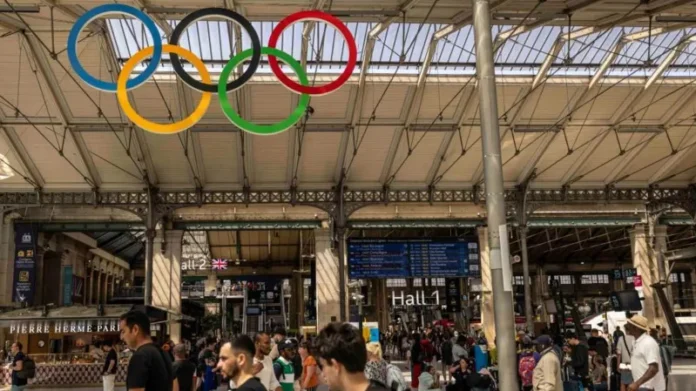
Hours before the highly anticipated opening ceremony of the Paris Olympics, French rail company SNCF has been struck by a “massive attack” that has severely disrupted its high-speed network.
The attack, described as involving “malicious acts” and “sabotage,” has led to delays and cancellations across several TGV lines serving the west, north, and east of Paris.
The incident has caused severe congestion at Montparnasse Station, a major hub for travel to western destinations.
With the opening ceremony set to take place on Friday, the disruption has raised concerns about the impact on spectators and athletes arriving in Paris for the Games.
The ceremony is expected to draw over 300,000 people to the city, with athletes scheduled to make a grand entrance along the River Seine.
Transport Minister Patrice Vergriete condemned the attacks as “criminal acts” that would severely affect holiday plans and travel arrangements.
The French government has expressed its commitment to addressing the situation, but SNCF has warned that the effects of the attack could persist “at least all weekend” while repairs are underway.
SNCF Chief Executive Jean-Pierre Farrandou revealed that fires had been deliberately set to damage the facilities, contributing to the disruption. He estimated that as many as 800,000 travellers have been impacted by the chaos.
“This was supposed to be a holiday,” Farrandou said in an emotional statement.
“It’s the big day for going on summer holiday, and it’s also, of course, the opening of the Olympics with lots of French people coming to Paris to enjoy the Games and all of that’s ruined.”
The sabotage was detected by SNCF’s systems around 04:00 local time (02:00 GMT), and emergency teams have been deployed to assess the damage and begin repairs.
The company has mobilized thousands of rail workers to address the crisis and minimize the disruption.
Eurostar services between London and Paris have also been affected, as the Paris to Lille high-speed line is part of its route.
The diversion of Eurostar and other high-speed services onto alternative lines has led to a cascading effect on various other train services, compounding the travel woes.
Sports Minister Amélie Oudéa-Castéra described the attacks as “downright appalling,” emphasizing the immediate and ongoing impact on both the public and Olympic athletes.
The full extent of the disruption is still being assessed, including how it will affect the transportation of teams to their competition sites over the weekend.
As the investigation into the attacks continues, a source close to the inquiry told AFP that the sabotage appeared to be coordinated.
No group has yet claimed responsibility, but authorities are concerned about the potential for further incidents.
The timing of the attacks has cast a shadow over the Olympic festivities, highlighting the vulnerabilities in critical infrastructure and raising questions about security measures in place for the Games.
The French government and SNCF are working diligently to resolve the situation, but the impact on transportation and public confidence remains significant.